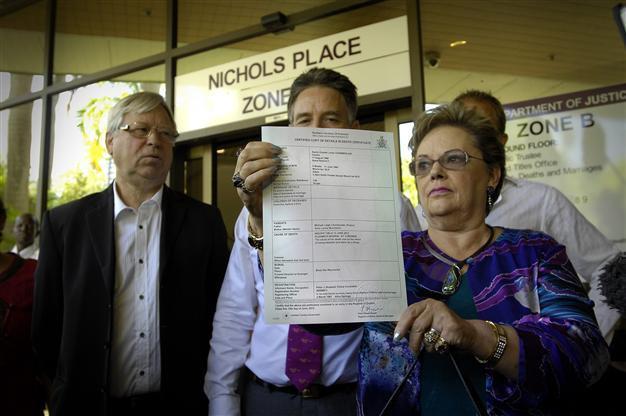Coroner rules dingo took Australian baby in 1980
SYDNEY - Agence France-Presse

Lindy Chamberlain-Creighton shows off the death certificate of daughter Azaria's death certificate, as ex-husband Michael Chamberlain (L) watches on outside the Births, Deaths and Marriages Registry in Darwin, Australia, 12 June 2012. EPA photo
A coroner Tuesday ruled that a dingo snatched baby Azaria Chamberlain from a tent in the Australian desert 32 years ago, ending a case that caused a global sensation and spawned a Meryl Streep movie.Azaria disappeared from the tent near Uluru, or Ayers Rock, in 1980 in an incident that sparked decades of debate in Australia over whether her mother Lindy, who was jailed for murder, was responsible for the infant's death.
"I find that a dingo took Azaria and dragged her from her tent," said coroner Elizabeth Morris in the Darwin Magistrates Court, adding that the evidence was sufficiently "adequate, clear, cogent and exact".
"It is clear that there is evidence that in particular circumstances a dingo is capable of attacking, taking and causing the death of young children," she said.
Lindy, now known as Chamberlain-Creighton after remarrying, always insisted a dingo took the baby, but her version of events was widely doubted by the Australian public.
The finding means she and her ex-husband Michael Chamberlain, who were both in court, have finally won recognition that a native wild dog killed their child.
"Please accept my sincere sympathy on the death of your special and loved daughter... Azaria," Morris said.
"I'm so sorry for your loss. Time does not remove the pain and sadness of the death of a child." Outside the court, an emotional Lindy -- who has three other children -- said she was relieved the case was over.
"Obviously, we are relieved and delighted to come to an end of this saga," she said.
"No longer will Australia be able to say dingoes are not dangerous and only attack when provoked. We live in a beautiful country, but it is dangerous." An amended death certificate was made available to Azaria's parents immediately, closing a decades-long chapter in Australian legal history.
Her father Michael thanked the "courageous and independent coroner", saying "the truth is out".
"This has been a terrifying battle," he said. "I cannot express strongly enough how important it is to pursue a just cause, even when it seems to be a mission impossible," he said.
The baby was just nine weeks old when she went missing on August 17, 1980 during a camping trip to the evocative red monolith in the heart of Australia's Outback.
The coroner ruled that shortly after Lindy placed Azaria in the tent that afternoon a dingo, or dingoes, entered, took the baby and carried and dragged her away.
Morris detailed how the mother was alerted to a baby's cry, and on returning to the tent saw a dingo nearby. She raised the alarm but despite an extensive search, the body was never found.
The mother was jailed for murder, and gave birth to her fourth child while in custody, despite an initial inquest which backed her explanation the baby was snatched.
The case inspired the 1988 hit film "A Cry in the Dark", starring Streep and Sam Neill, along with books, a TV mini-series and even an opera, and was followed closely by foreign media, making it a global cause celebre.
The convictions of Chamberlain and her then husband Michael, who was given a suspended term for being an accessory, were overturned in 1988 after the chance find of a piece of Azaria's clothing near a dingo lair.
A third inquest in 1995 recorded an open finding, in a case that continues to fascinate the Australian public.
The inquest was reopened after new information from the Chamberlains' counsel about dingo attacks, including a nine-year-old boy who was killed by a wild dog in 2001 and a two-year-old girl who died in 2005.
















